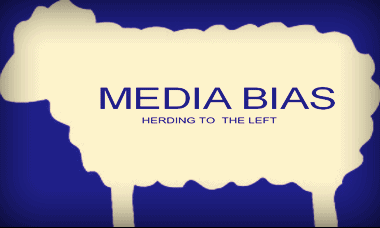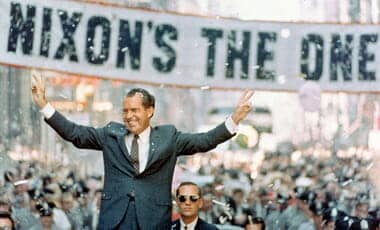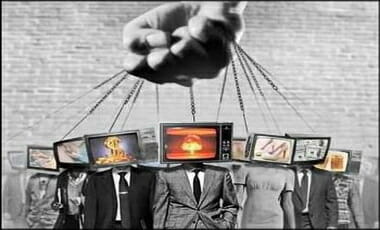Most in the media say they just report the facts. But is that true? Joe Concha says no. He writes about media for The Hill.
Joe Concha


John Dean’s “Worse Than Watergate” Game-show (UPDATED)
Sean Hannity Monologues, but he has Joe Concha on to discuss John Dean’s jump at monitory payoffs. Or, as the FEDERALIST puts it, “JOHN DEAN STARS IN ‘WORSE THAN WATERGATE!’“:
….It was in 1987 that Dean argued that Ronald Reagan’s Iran-contra scandal was worse than Watergate….. It was 2005, when Democrats were toying around with the idea of impeaching George W. Bush, that then-Sen. Barbara Boxer sent a letter presidential scholars, asking them about comments “by Richard Nixon’s lawyer John Dean that Bush is ‘the first president to admit to an impeachable offense’.”…….
Concha ends the interview (what little of it there is) with just how crazy the Left is.
More from the FEDERALIST:
John W. Dean likes to refer to himself as a “Nixon historian” these days, which is more or less like calling Willie Cicci the “chronicler” of the Corleone family saga.
Politico reports that House Judiciary Committee is preparing to call the “Watergate star witness and former Nixon White House counsel” to testify about the Mueller report, in “an effort to draw public attention” to the possible impeachment of President Donald Trump.
The word “star,” often used to describe Dean, is, at best, a poetic truth. His expertise on the issue of impeachment, long sought by liberals, was acquired by helping plan one of the most infamous scandals in American political history, snitching on everyone who conspired with him and then cashing in on the fallout for the next 47 years.
It’s what someone in Cicci’s line of work might call a “racket.” Good work if you can get it.
As White House counsel, Dean had known about the eavesdropping that ended the Nixon presidency even before Nixon did. He was not some innocent man swept up in the ugly currents of history. Assistant U.S. Attorney Earl Silbert accused Dean of not only being “at the center of the criminality” but also withholding crucial evidence while plea bargaining his way out of trouble.
There’s no evidence that Dean agreed to be a whistleblower because of a tortured conscience or because he wanted to preserve law and order or even because he was attempting to save the Nixon presidency, as he likes to claim. There is evidence, however, that he turned to the Feds when Nixon refused to promise him immunity from prosecution.
[….]
Was Dean on Nixon’s list? Well, no doubt he was reviled by the White House once he turned on the president. Anyone who’s read about Watergate, though, is likely aware that the non-fictional Dean was sent the infamous Enemies List back in 1971.
Did he heroically run to the Justice Department? Did he leak it the news to the media? No, his office wrote a confidential memo detailing how the list could utilize “available federal machinery,” like tax audits from the IRS, “to screw our political enemies.” It was Dean who, after Nixon suggested that if he wins a second term the White House should target the president’s enemies more aggressively, responded, “That’s an exciting prospect.”
I’ve seen Dean get away with bragging about how he warned Nixon that there was “a cancer on the presidency” on numerous occasions. As the audiotape of the incidentshows, Dean was referring to a political threat to Nixon, not an ethical one that threatened the office. Here he is, making the claim—while conspiracy mongering about the Russia investigation—to CNN’s Jake Tapper, who gets a kick out of the idea that Trump believes Dean, who was convicted of obstruction of justice and disbarred, might be the “villain” in this story. He was surely one of them.
Dean is a useful guest for a media that hasn’t been able to stop making insipid Watergate comparisons since Watergate itself. For Democrats, and only Democrats, Dean also serves much the same purpose he did in government. A consummate yes man.
It was in 1987 that Dean argued that Ronald Reagan’s Iran-contra scandal was worse than Watergate. Much much worse, in fact. “The Iran-contra inquiries involve matters of national security,” Dean explained at the time. “Watergate, on the other hand, involved the political security of Richard Nixon. These are Major League matters versus Little League.”
It was 2005, when Democrats were toying around with the idea of impeaching George W. Bush, that then-Sen. Barbara Boxer sent a letter presidential scholars, asking them about comments “by Richard Nixon’s lawyer John Dean that Bush is ‘the first president to admit to an impeachable offense.’”
Dean’s quote was heavily leaned on at time. Hey, if the “star” witness of Watergate says impeachment is on the table, aren’t we compelled to listen? Dean, in fact, had written an entire book—“Worse than Watergate”—making the case that both Bush and Vice President Dick Cheney should be impeached for lying to Congress…………

Media Standards (Joe Concha | Mollie Hemingway)
(RIGHT SCOOP) This is a great segment from Mark Levin’s show last night where he interviews both Joe Concha and Mollie Hemingway on the very apparent media bias and smears during the Kavanaugh allegations.
The media are working overtime not just to prevent the eminently qualified Brett Kavanaugh from being confirmed to the Supreme Court, but to destroy his life as well. One of their avenues is to make it impossible for him to coach girls’ basketball in the future.
USA Today’s Erik Brady wrote:
The U.S. Senate may yet confirm Kavanaugh to the Supreme Court, but he should stay off basketball courts for now when kids are around…
The nation is deeply divided. Sometimes it feels like we don’t agree on anything anymore. But credibly accused sex offenders should not coach youth basketball, girls or boys, without deeper investigation. Can’t we all agree on that?
The article, which was illustrated with a picture of Kavanaugh and one of the girls’ basketball teams he coaches, has since been dramatically revised. Apparently editors at USA Today realized that calling a human being a pedophile with precisely zero actual evidence of any sexual impropriety was indefensible.
“This is disgraceful,” wrote Jedediah Bila. “The man was accused of atrocities with no evidence, no corroboration, no proof. He’s undergone 6 FBI investigations in his life. Maybe wait to criminalize someone till you have damn good reason? I’m utterly disgusted.”….
JOE:
…Stelter argued that the press is being targeted as part of a “hate movement” spearheaded by the president, who regularly decries the news media as “fake news” and “the enemy of the people.”
“He has been wonderful for the industry,” said Koppel, who currently serves as a CBS contributor.
“But that means what?” responded Stelter, a staunch critic of the Trump. “If ratings are up, that means what?”
“It means you can’t do without Donald Trump,” Koppel replied. “You would be lost without Donald Trump.”
“Ted, you know that’s not true,” Stelter said.
“CNN’s ratings would be in the toilet without Donald Trump,” Koppel declared.
“You know that’s not true; you’re playing for laughs,” Stelter said. “You’ve lived through enough presidencies to know there will be more presidents.”
After some back-and-forth over what CNN’s ratings would look like if Trump hadn’t won the presidency, Stelter said he didn’t accept the notion that broadcast networks were benefiting from money generated from the additional eyeballs Trump brings to the table.
“I reject the premise that these networks are making so much money off of Trump and thus, we benefit from it,” Stelter said.
Koppel joked that discussing CNN’s ratings was “a sensitive subject” for Stelter, and pivoted instead to MSNBC.
“Tell me for a moment if you will — let’s get away from CNN; sensitive subject,” he said to laughter from the audience. “Let’s go to MSNBC. Is there a moment of the day when they’re not focusing on Donald Trump, or some intimately related subject?”…
(More JOE)

Mark Steyn Talks To Joe Concha About Media Malpractice
INFO UPDATE:
- All of Ford’s named witnesses of the party, both male and female, have now denied any recollection of attending such a party.
(WEEKLY STANDARD; CNN, POWERLINE, NATIONAL REVIEW, WESTERN JOURNAL, WASHINTON TIMES).
Mark Steyn filled in for Rush on Friday, and I caught this interview that discusses just how bad the media has gotten in regard to anything Republican. Joe’s article can be found at THE HILL.
An extended excerpt from Joe Concha’s article:
The examples of misleading tales are apparent for all to see, mostly on the anti-Kavanaugh side.
For example, MSNBC goes heavy with a story affirming the allegations from Ford’s classmate based on a Facebook post. The classmate later admitted to not even knowing Ford or hearing a story firsthand. The national news outlet covered this without, apparently, any reasonable vetting.
“I did not know her personally but I remember her. This incident did happen,” Ford schoolmate Christina King Miranda wrote. “Many of us heard a buzz about it indirectly with few specific details. However, Christine’s vivid recollection should be more than enough for us to truly, deeply know that the accusation is true.”
This was enough for MSNBC and other outlets to run with the story.
Third-party tale? She didn’t know Ford directly? Screw it. Let’s go with it anyway.
It’s gossip treated as gospel.
MSNBC would later in a subsequent tweet note that King Miranda had removed the post without deleting the initial tweet, which was retweeted nearly 900 times.
The follow-up tweet was retweeted less than 100 times, or nine times fewer, for those keeping score at home.
“That it happened or not, I have no idea,” King Miranda told NPR on Friday. “I can’t say that it did or didn’t.”
“I had no idea that I would now have to go to the specifics and defend it before 50 cable channels and have my face spread all over MSNBC news and Twitter,” she later added.
Meanwhile, CNN anchor Jim Scuitto tweets out an incomplete claim about how and where Ford could potentially be interviewed, publicly or privately or in Washington, D.C., or California, where she lives. The tweet’s omission is egregious enough that committee chairman Sen. Charles Grassley’s (R-Iowa) office is forced to respond to.
“The offer to #ChristinaBlaseyFord is blunt: testify in public six days from now while under death threats or your allegation will be ignored in the confirmation of a SCOTUS nominee. That is quite a choice,” Scuitto wrote in a tweet that is retweeted more than 7,600 times and liked 17,000 times.
“This is not close to the offer to #ChristinaBlaseyFord,” replied Grassley’s office to Scuitto, a former Obama State Department official. “Chairman Grassley offered an open or closed hearing, reached out to discuss timing that would work for Dr. Ford, has even offered to send staff to California. This deserves a correction.”
More than 20 hours later, Sciutto sends a second tweet clarifying his original tweet. That is retweeted just 134 times and liked just 320 times.
[….]
Washington Post bureau chief Philip Rucker also was lambasted for a story involving a photo showing a ritual that Kavanaugh’s fraternity at Yale participated in back in 1985 involving a flag woven together by women’s underwear.
[….]
[….]
One small problem: The photo doesn’t have Kavanaugh in it….
(Read it all at THE HILL)
POWERLINE notes another glaringly wrong media story (see Kimberley’s TWITTER for more):

Tucker Carlson Faces Off with WHCA President, Jeff Mason
The second video was the next guest, Joe ConCha, who commented on Jeff Mason’s previous comments. Jeff was still in studio and cam back on. Great exchanges!




